While there are many prescription medications and therapies available to manage anxiety, people are turning to cannabis microdosing to get calmer with THC, CBD, and other compounds. How does cannabinol (CBN) affect anxiety?
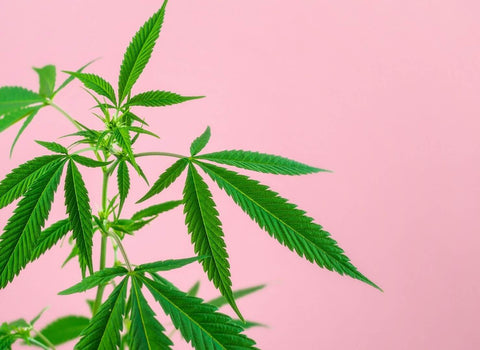
CBN is a minor, non-psychoactive plant that is gaining popularity for promoting relaxation and relieving stress. Though science is calling for more research on the effects of CBN on anxiety and depression, it shows promise for being a potential natural treatment for anxiety conditions. Let’s explore CBN’s potential as a natural anxiety treatment.
What is CBN?
Cannabinol is a minor cannabinoid found in the cannabis plant (cannabis sativa, cannabis indica, and cannabis ruderalis). It can be extracted from hemp plants or marijuana and is produced from the oxidation process of THC. As THC breaks down, CBN is formed.
Despite CBN being a byproduct of THC, it is not generally psychoactive. OK, maybe in really high doses it could be mildly psychoactive, but in the sort of doses our CBN gummies contain, it won’t produce a high at all.
CBN is known to be a well-tolerated substance that does not produce adverse effects. Rarely, high doses of CBN have been known to cause dry mouth, drowsiness, and nausea—but these effects subside within hours of consumption.
Our vegan CBN gummies are made with just 5 mg of CBN per dose, extracted from high-quality 100% American hemp. Packed with all-natural strawberry flavors, these CBN products are just the thing to calm your racing mind.
CBN and the Endocannabinoid System
The endocannabinoid system (ECS) is a system of neurotransmitters and receptors that play a crucial role in regulating various physiological and cognitive processes in the body, including sleep, mood, stress response, and anxiety.
Neurotransmitters send messages to cannabinoid receptors throughout the body, including the brain, immune system, and some organs. These neurotransmitters bind to the CB1 and CB2 receptors to maintain the body’s homeostasis. Effects include modulating the inflammatory response, pain management, and sleep. CB1 receptors are primarily found in the brain and nervous system and regulate pain, mood, and appetite. CB2 receptors are primarily found in immune cells and regulate inflammation and immune cell functionality.
Like neurotransmitters, CBN binds to the CB1 and CB2 receptors, activating them to carry out their physiological and cognitive processes. Though CBN does bind to the CB1 receptor, it seems to attach to the CB2 more often. This means CBN’s potential benefits on inflammatory responses and immune cell function could be stronger than some of its other effects.


THC: 10 mg | CBC: 10 mg | CBD: 10 mg | CBG: 5 mg | CBN 5mg
What Does Anxiety Do to the Body?
Anxiety is a psychological and physiological response involving multiple systems in the body, including the endocannabinoid system. Studies have shown that the ECS is beneficial in the regulation of anxiety-like behaviors. People with anxiety have lower levels of endocannabinoids and lower CB1 and CB2 activity. A weakened ECS prevents the body from managing anxiety symptoms.
Anxiety activates the sympathetic nervous system, which triggers the release of stress hormones. The overactivity of these hormones can cause rapid breathing, increased irritability and frustration, and high blood pressure. People with anxiety may experience persistent feelings of worry, fear, and intrusive thoughts. This type of stress on the body also causes serotonin levels to drop. Serotonin is a neurotransmitter that controls mood and emotional responses. Anxiety is known to increase when serotonin levels are low.
Chronic activation of stress hormones like cortisol and adrenaline can cause anxiety disorders and other health issues.
- Muscle tension
- Digestive issues
- Sleep disturbances
- Increased heart rate and blood pressure
- Panic attacks
Researchers are continuing to explore the underlying contributing factors of anxiety. Anxiety symptoms do vary from person to person and can depend on the person's overall health, genetics, and stress responses. Chronic symptoms can lead to anxiety disorders, panic disorders, social anxiety disorders, and specific phobias.
Effective treatment seems to involve a combination of behavioral and psychological interventions, along with anxiety medications. Some medical professionals will prescribe selective serotonin reuptake inhibitors (SSRIs). Others will take benzodiazepines, a sedative that relieves anxiety. Though beta-blockers are most often prescribed to people with high blood pressure, they are also used as an anti-anxiety medication.
Unfortunately, most prescription medications are addictive and come with a slew of potential side effects. As anxiety statistics continue to rise in the United States, people are looking for a healthier and safer alternative to this type of medicine. Many people are microdosing cannabis for anxiety because it is not addictive and does not pose any serious health risks. But is CBN good for anxiety? The verdict is yes.
How Does CBN Reduce Anxiety?
CBN oils seem to produce anxiolytic effects via improved sleep, lowered cortisol, and lowered inflammation.
Let’s look at the sedative, anti-inflammatory, and neuroprotective effects of CBN to understand it a bit better.
Sedative Effects
People with anxiety often struggle with sleep, experiencing racing thoughts, and restlessness before bed. Anxiety can also cause muscle tension and heart racing, making sleep even harder. Microdosing cannabis promotes better sleep by offering calming effects that make it easier to transition to rest mode. CBN has been found to have sedative properties and can be used as a natural sleep aid for people with anxiety-related sleep issues. However, studies point to CBN’s sedative benefits being most effective when taken with other cannabis compounds.
You can read our guide to dosing CBN for sleep to learn more.
Anti-inflammatory and Pain-Relieving Effects
Chronic pain and inflammatory conditions can cause stress on the body, which can exacerbate anxiety. CBN has anti-inflammatory properties and is known to help treat conditions like arthritis and fibromyalgia. Research shows CBN inhibits inflammatory hypersensitivity and decreases muscle sensitization.
CBN seems to offer pain relief, too. A study entitled “Cannabidiol, cannabinol and their combinations act as peripheral analgesics in a rat model of myofascial pain” concluded that consuming CBN could improve symptoms of myofascial pain syndrome. People with multiple sclerosis and temporomandibular disorders often microdose edibles to relieve pain.
Appetite Stimulant
Anxiety can affect one’s appetite, digestion, and weight management. In some animal studies, CBN proved to be helpful in stimulating appetite. It may be useful for people with eating disorders, those who struggle with unwanted weight loss, or patients undergoing chemotherapy for conditions like breast cancer.
Neuroprotection
There is evidence to suggest that chronic stress and anxiety could have a negative effect on the brain, causing impaired cognitive function, mood disorders, and an increased risk of neurodegenerative diseases.
Some medically reviewed studies suggest that CBN may have neuroprotective properties, potentially making it useful for conditions such as Alzheimer’s disease and other neurodegenerative disorders. A clinical trial on animals determined that CBN could help in the treatment of health conditions like amyotrophic lateral sclerosis (ALS). These neuroprotective properties could protect brain cells from damage and cell death.
Product QUIZ
Need help deciding what product is best for you? Take our quiz, just three questions until your perfect match!
CBN and The Entourage Effect
The entourage effect is the hypothesis that various chemical compounds in the cannabis plant (such as cannabinoids, terpenes, and flavonoids) have a natural synergy. Together, these compounds produce stronger health benefits than taking one single compound on its own. The theory suggests that whole-plant cannabis extracts are the way to go.
A key component of the entourage effect is tetrahydrocannabinol (THC), the most well-known cannabinoid in the cannabis plant. One achieves the entourage effect through full-spectrum CBD products that contain THC, CBD, CBN, and other compounds together. When you mix CBD and CBN extracts with THC and other chemical compounds, they enhance each other’s effects for a more potent experience.
THC and CBD pair well together because CBD downregulates THC’s psychoactive effects, making it a more tolerable substance. Though CBD and THC have similar benefits, the way they offer those benefits may vary. For example, both CBD and THC are known to reduce pain. THC works with the brain to alter pain perception, and CBD is known to target inflammation and oxidative stress in the body.
One only needs microdoses of THC to achieve the entourage effect without experiencing potential risks and side effects. Microdosing means taking very small amounts of THC to get a more controlled and subtle effect. A microdose of THC is anything under 10 mg per dose.
For people who want to avoid the intoxication and paranoia that could come from taking too much THC, microdosing offers a variety of benefits. In the context of anxiety, microdosing THC has been known to boost serotonin levels in the body to improve mood and happiness. Since too much THC could cause panic symptoms to be exacerbated, people will microdose edibles to improve concentration, reduce intrusive thoughts, and improve sleep.
Shop our collection of full-spectrum CBD gummies for low doses of carefully curated blends of hemp THC you can use for an assortment of needs to improve your sleep, mood, and overall health. All of our products contain clean ingredients that have been third-party lab tested for quality assurance. (Check out our guide on where to purchase Delta 9 edibles in every state.)
If you want to buy CBN that does not have THC, CBD, or other cannabinoids, you want to look for an isolated CBN cannabis product. You can buy a broad-spectrum CBD product, which contains other cannabis compounds, but no THC.
Like our broad-spectrum CBD gummies, perfect for all-day use with just 10 mg of CBD.
Is CBD vs. CBN Better for Anxiety?
Taking either CBD or CBN could potentially lower anxiety. The effectiveness of either cannabinoid for anxiety could depend on the individual and the type of anxiety they are dealing with. (Read our guide to the best weed strains for anxiety and focus.)
Cannabidiol (CBD) is the major non-psychoactive compound in cannabis and is widely used for relieving pain, boosting appetite, improving sleep, and reducing anxiety. CBD interacts with serotonin receptors in the brain, helping to regulate mood. Unlike CBN and THC, CBD does not bind directly to the CB1 and CB2 receptors in the body. This cannabinoid indirectly interacts with the receptors, antagonizing them to respond and react.
CBD’s benefits on the body are similar to those of CBN in improving overall mood and health, but because it’s a much more studied cannabinoid, its benefits on anxiety are more clear. Using CBD oil and other CBD products is also well-tolerated by users, even in high doses. One of the differences between CBD and CBN is that, in high doses, CBN could cause mild psychoactivity, but CBD won’t at any dose.
Is CBN Legal?
In the United States, CBN derived from hemp is considered a federally legal substance under the 2018 Farm Bill. Hemp refers to a cannabis plant that has no more than 0.3% THC by dry weight.
CBN for Anxiety FAQ
CBN can improve mental health and reduce anxiety by boosting serotonin levels when taken with CBD and THC. Studies show that microdosing THC can boost serotonin, so taking it with CBN will enhance the latter’s anti-anxiety effects.
CBN could cause a positive drug test if there are trace amounts of THC in the product you’re using. Drug screenings look for THC metabolites in the body. If your CBN product also contains THC, even in trace amounts, you run the risk of failing a drug test.
Dosing cannabis is not a one-size-fits-all type of deal. Everyone’s tolerance is different and varies depending on factors like genetics, health, pre-existing conditions, metabolism, and more. That’s why it’s important to take a slow and steady approach. This means starting with low doses of CBN and slowly increasing your dose over time if you need to. A little experimentation is helpful, and starting with low doses ensures you don’t experience side effects. Dosing topicals like CBD creams with CBN could be a bit more difficult, so read your labels carefully to see what the company suggests you use.
There can be CBN in hemp seed oil, depending on the type of product you buy. Studies have shown that hemp seed oil could contain many minor cannabinoids like CBN along with major cannabinoids like THC and CBD.
Top Sellers
New? Start with our Ultimate Sampler!

THC: 10 mg | CBC: 10 mg | CBD: 10 mg | CBG: 5 mg | CBN 5mg
Citations:
Hsu, Y. H., Fang, M. C., Huang, S. C., Kao, Y. M., Tseng, S. H., & Wang, D. Y. (2021, September 15). Determination of cannabinoids in hemp oil based cosmetic products by LC-tandem MS. PubMed Central (PMC). https://doi.org/10.38212/2224-6614.3370
Farm Bill. (n.d.). Farm Bill | USDA. https://www.usda.gov/farmbill
Cannabinol delays symptom onset in SOD1 (G93A) transgenic mice without affecting survival - PubMed. (2005, September 1). PubMed. https://doi.org/10.1080/14660820510030149
Cannabinol and cannabidiol exert opposing effects on rat feeding patterns - PubMed. (2012, September 1). PubMed. https://doi.org/10.1007/s00213-012-2697-x
Cannabidiol, cannabinol and their combinations act as peripheral analgesics in a rat model of myofascial pain - PubMed. (2019, August 1). PubMed. https://doi.org/10.1016/j.archoralbio.2019.05.028
Anthony, A. T., Rahmat, S., Sangle, P., Sandhu, O., & Khan, S. (2020, September 14). Cannabinoid Receptors and Their Relationship With Chronic Pain: A Narrative Review. PubMed Central (PMC). https://doi.org/10.7759/cureus.10436
Cannabinol and Sleep: Separating Fact from Fiction - PubMed. (2021, October 1). PubMed. https://doi.org/10.1089/can.2021.0006
Lutz, B., Marsicano, G., Maldonado, R., & Hillard, C. J. (n.d.). The endocannabinoid system in guarding against fear, anxiety and stress. PubMed Central (PMC). https://doi.org/10.1038/nrn4036
nama CBD FDA & Legal Disclaimer
Our products are not intended as a medical advice, diagnosis, or treatment of any disease. They are not a replacement for prescription medications and have not been evaluated by the Food and Drug Administration (FDA).
The information provided on this website does not, and is not intended to, constitute legal advice or any statements of the status of any laws. Any information, content, and materials available on this site are for general informational purposes only, and are not intended to be relied upon for any purpose.
Readers of this website should contact their attorney to obtain advice with respect to any particular legal matter including decisions on what products are, or are not, legal to sell, possess, or consume. No reader, user, or browser of this site should act or refrain from acting on the basis of information on this site without first seeking legal advice from their own counsel in the relevant jurisdiction.
Only your individual attorney can provide assurances that the information contained herein – and your interpretation of it – is applicable or accurate for your particular situation. Use of, and access to, this website or any of the links or resources contained within the site do not create an attorney-client relationship between the reader, user, or browser, and website authors, contributors, contributing law firms, or committee members and their respective employers.
About
Learn
Join us on this journey

© Copyright 2026 nama Products LLC. All Rights Reserved.
†These statements have not been evaluated by the Food and Drug Administration. These products are not intended to diagnose, treat, cure or prevent any disease. All information presented here is not meant as a substitute for or alternative to information from health care practitioners. Please consult your health care professional about potential interactions or other possible complications before using any product.
††The information provided on this website does not, and is not intended to, constitute legal advice or any statements of the status of any laws. Any information, content, and materials available on this site are for general entertainment purposes only, and are not intended to be relied upon for any purpose.

By clicking ‘Yes,’ you agree to our
Terms & Conditions and Privacy Policy
123 John Doe Street
Your Town, YT 12345
Store Hours
Sun: Closed
Mon-Fri: 9:00 - 17:00
Sat: 10:00 - 13:00
What to expect at pickup
Closed
Closing at 5pm
Closing at 5pm
Closing at 5pm
Closing at 5pm
Closing at 5pm
Closing at 1pm

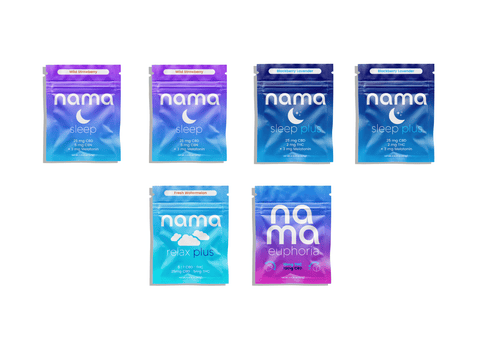
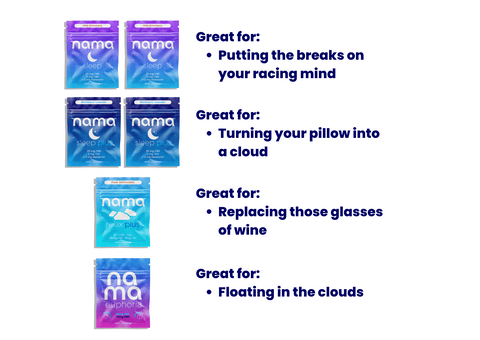
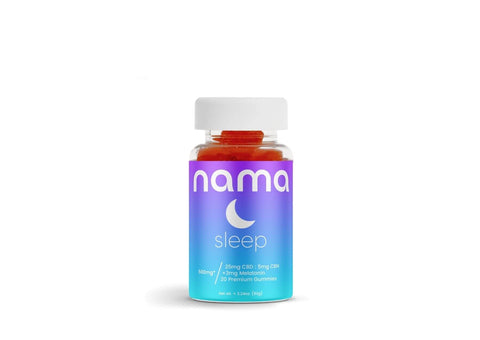
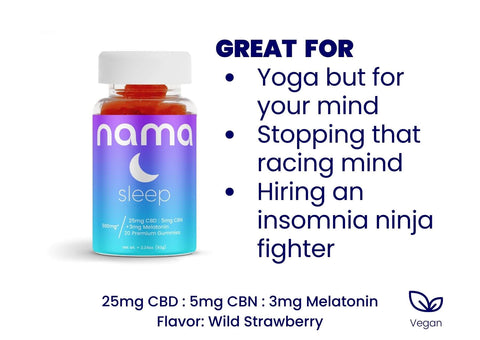
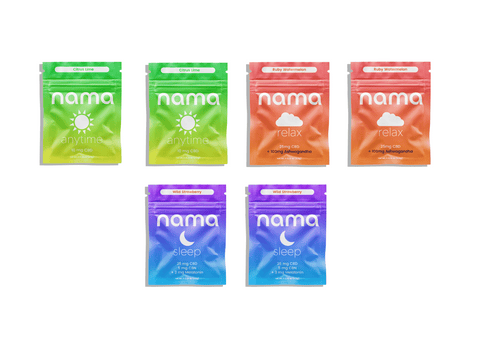
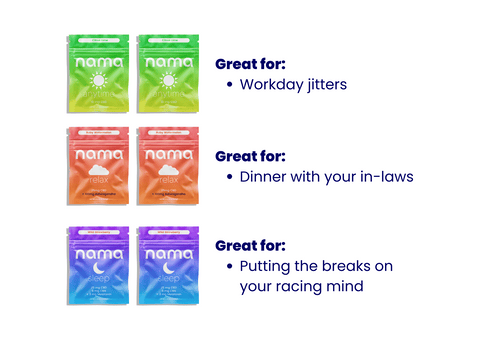
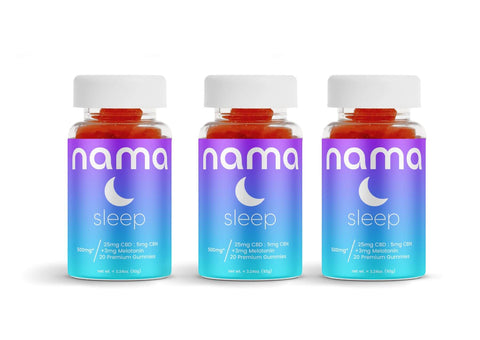
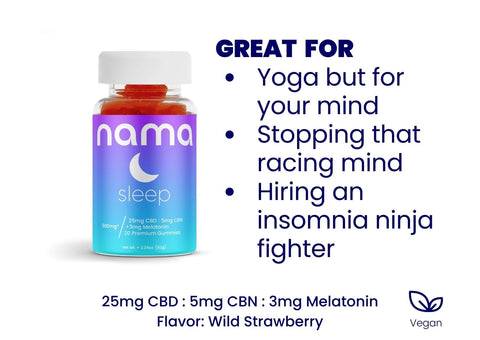


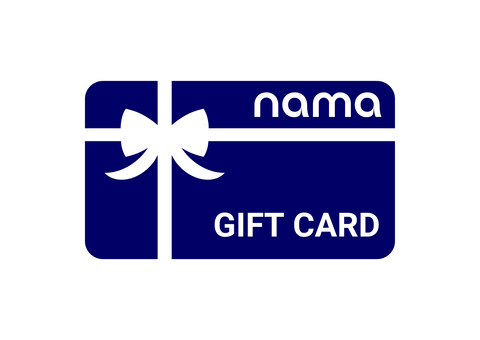







![Buzz Packs™ [THC and CBD Powder Drink Mix]](http://www.namacbd.com/cdn/shop/files/nama_buzz_packs_thc_drink_pack_white_background.png?v=1769586244&width=480)
![Buzz Packs™ [THC and CBD Powder Drink Mix]](http://www.namacbd.com/cdn/shop/files/Buzz_Packs_Label.png?v=1769586244&width=480)
![Buzz Drops™ [THC Drink Drops]](http://www.namacbd.com/cdn/shop/files/nama_thc_buzz_drops.png?v=1711412866&width=480)
![Buzz Drops™ [THC Drink Drops]](http://www.namacbd.com/cdn/shop/files/buzz-drop-wine-comparison.png?v=1736882023&width=480)
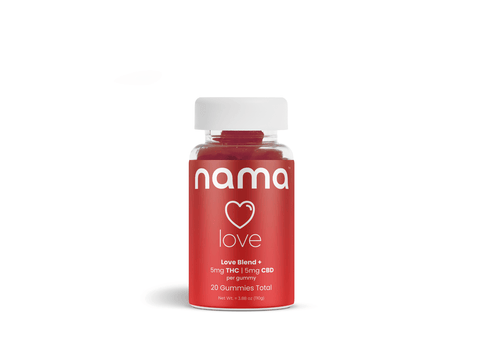
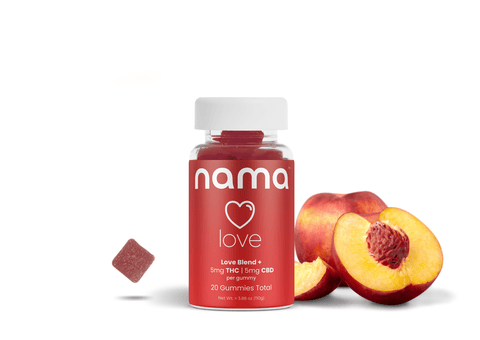


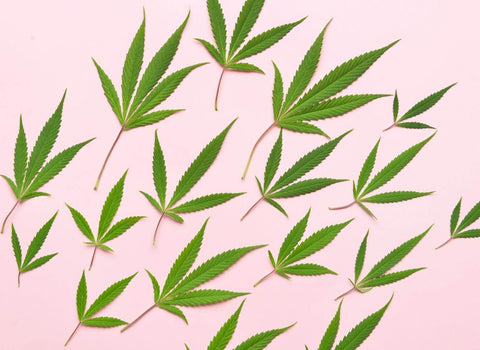
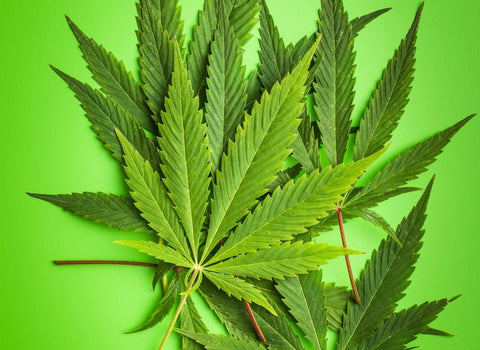

Comments (0)
There are no comments for this article. Be the first one to leave a message!